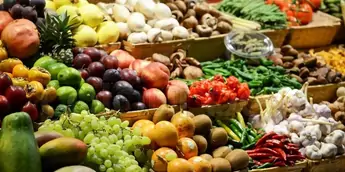Health
Five Foods You Should Never Eat With Beans

Beans, a staple in Nigerian cuisine, is renowned for its high protein content and affordability, making it a favorite among various households. Whether it’s cooked as plain beans, porridge, or blended into delicacies like moi-moi and akara, beans provide a nutritious meal packed with essential nutrients.
However, while beans is an excellent source of protein, there are certain foods that health experts advise against pairing with it. Consuming these food combinations may not only reduce the nutritional benefits of beans but could also cause digestive discomfort and other health issues.
In this report, Dtruth Insights explores five foods that should be avoided when consuming beans. By understanding why these combinations can be harmful, you’ll be better informed to make healthier choices and maximize the benefits of this protein-rich legume. Here are some foods you should avoid pairing with beans:
While beans are a rich source of protein and fiber, pairing them with milk is generally discouraged. The digestive process for beans is complex due to its high fiber and protein content, which requires considerable time and energy for the body to break down. Adding milk to the mix, which is also high in protein and contains lactose, can lead to digestive discomfort. Many Nigerians, especially adults, have some degree of lactose intolerance, which makes it difficult for them to properly digest lactose, the sugar found in milk.
When beans and milk are consumed together, the body struggles to handle both the high-fiber beans and the lactose in milk simultaneously. This often results in bloating, gas, and even stomach cramps for those with lactose intolerance. Consuming beans with milk can also slow down digestion, leading to a feeling of heaviness and discomfort.
Furthermore, the protein structure in milk may hinder the absorption of certain nutrients in beans. Milk contains casein, a protein that can compete with the proteins in beans for absorption, thereby reducing the overall nutritional benefit. To avoid these issues, it’s advisable to separate the consumption of beans and milk, allowing your body ample time to digest each food properly.
Instead of pairing beans with milk, consider other beverages or drinks that are easier on the stomach, such as water or herbal teas, which aid in digestion and prevent any discomfort associated with heavy food combinations.
Bananas, although nutritious, should be avoided when eating beans. Beans, high in fiber and protein, require a slow and complex digestive process, while bananas are rich in simple sugars that are quickly digested. This mismatch in digestion rates can cause discomfort. The rapid digestion of bananas may cause the beans to ferment in the stomach, leading to gas and bloating.
Another reason to avoid this combination is the high potassium content in bananas. While potassium is beneficial to the body, combining it with the iron and protein in beans can create an imbalance. This is particularly relevant for individuals who have kidney issues, as a high intake of potassium may lead to hyperkalemia, a condition where there is too much potassium in the blood.
For those with sensitive stomachs, the combination of beans and bananas can exacerbate digestive issues such as acid reflux or constipation. It is generally better to eat bananas separately from beans to ensure each food is digested effectively. If you crave something sweet alongside beans, consider apples or a small serving of pineapple, as these are easier on the digestive system.
Overall, separating bananas from beans allows the body to absorb nutrients more efficiently, avoiding any potential digestive disruption and ensuring a smoother digestion process.
Eggs are another protein-rich food that doesn’t pair well with beans. Consuming beans and eggs together creates a protein-heavy meal that can be hard on the digestive system, especially for those with weaker stomachs. Both beans and eggs require different digestive enzymes, which can slow down digestion and lead to discomfort, bloating, and gas.
The high sulfur content in eggs can also lead to unpleasant odors when consumed with beans, as beans are already known for causing flatulence. This combination can result in excessive gas production, causing discomfort in social settings or during the day. Additionally, the simultaneous digestion of two high-protein foods may burden the digestive tract, leading to stomach cramps or indigestion.
Eggs can also interfere with iron absorption from beans. Beans are a good source of non-heme iron, which is not as readily absorbed as heme iron found in animal products. The presence of protein and calcium in eggs can inhibit the absorption of non-heme iron, reducing the nutritional benefits of eating beans.
To avoid these issues, it is best to enjoy beans and eggs separately. Consider having beans for breakfast or lunch, and save the eggs for another meal, allowing your digestive system to process each protein source without being overwhelmed.
Yogurt, especially when consumed alongside beans, can lead to digestive issues. Yogurt contains live bacteria, which is beneficial for gut health but may react unfavorably with beans. Beans are high in oligosaccharides, a type of carbohydrate that is hard to digest and can ferment in the stomach.
When mixed with yogurt, the fermentation process can intensify, leading to bloating, gas, and stomach cramps. The acidic nature of yogurt can also interfere with the absorption of nutrients from beans.
Beans contain minerals like iron and calcium, which may not be fully absorbed if consumed with acidic foods. This interaction can result in decreased nutritional benefits and might cause mild gastrointestinal discomfort in sensitive individuals.
Additionally, for those who are lactose intolerant, the lactose in yogurt combined with the complex carbohydrates in beans can lead to severe digestive distress. This combination is particularly unsuitable for those with sensitive stomachs, as it may cause discomfort and lead to an unpleasant eating experience.
It’s best to consume yogurt on its own or pair it with other foods like fruits. This ensures that the live bacteria in yogurt can provide its probiotic benefits without being hindered by the complex digestive process beans require.
While it might be tempting to enjoy a cold soda with a hearty meal of beans, carbonated drinks are among the worst beverages to pair with beans. The gas in carbonated drinks, combined with the natural gas-producing properties of beans, can result in excessive bloating and flatulence.
The carbonation in these drinks introduces carbon dioxide into the stomach, which mixes with the undigested fiber in beans, causing discomfort.
Moreover, the high sugar content in most carbonated drinks can cause a rapid spike in blood sugar levels. Beans, being rich in fiber, have a low glycemic index, meaning they release sugar into the bloodstream slowly.
Mixing them with a high-sugar drink disrupts this balance, potentially leading to a sugar crash shortly after the meal.
Acidity in carbonated beverages can also interfere with the digestion of beans. The acidic pH of soda can reduce the activity of enzymes needed to break down beans, leading to incomplete digestion. This can result in bloating and stomach pain, especially for those who are sensitive to acidic foods.
For a healthier alternative, pair beans with water or a warm, non-carbonated beverage. This aids digestion and ensures that you enjoy the nutritional benefits of beans without the side effects caused by carbonated drinks.
-

 Breaking News3 years ago
Breaking News3 years agoBREAKING: CBN Redesigns Naira Notes
-

 Breaking News2 years ago
Breaking News2 years agoBREAKING: Tinubu Considers Temporary Subsidy On Petrol
-

 Breaking News2 years ago
Breaking News2 years agoJUST IN: Gbajabiamila Dies In UK
-

 News3 years ago
News3 years agoDrama As Church Gives Certificate Of Virginity To Ladies After Testing Them (See Photos)
-

 Crime3 years ago
Crime3 years agoUproar As Student Teacher On Teaching Practice Impregnates 24 Girls, Headmistress, Four Female Teachers
-

 Breaking News9 months ago
Breaking News9 months agoJUST IN : Sacked Osun LG Chairman Killed Few Minutes After Returning To Office
-

 Breaking News2 years ago
Breaking News2 years agoBREAKING: Dangote Speaks As BUA Reduces Price Of Cement
-

 Crime3 years ago
Crime3 years agoJUST IN: Gunmen Storm Osogbo, Kill Man, Daughter Few Hours After His Wife Put To Bed (Photos)












